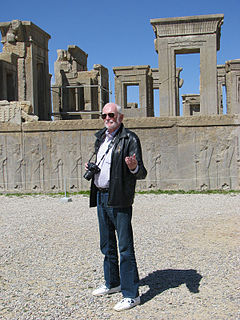A Quote by Edwin Hubbel Chapin
The temptation is not here, where you are reading about it or praying about it. It is down in your shop, among bales and boxes, ten-penny nails, and sand-paper.
Related Quotes
Ink and paper are as cheap as sand or water, almost. No board of directors has to convene in order to decide whether we can afford to write down this or that. I myself once staged the end of the world on two pieces of paper- at a cost of ...less than a penny, including wear and tear on my typewriter ribbon and the seat of my pants.
'Think of that.
The single most important technique for making progress is to write ten words. Doesn't matter if you're badly stuck, or your day is completely jam-packed, or you're away from your computer - carry a small paper notebook and write a sentence of description while you're waiting on line at a coffee shop. I think of this as baiting a hook. Even if you have a few days in a row where nothing comes except those ten words, I find that as long as you have to think about the novel enough to write ten words, the chances are that more will come.
Sit down at ten o'clock in the morning and write anything that comes into my head until twelve. One of the few things I've discovered about writing is to form a habit that becomes an addiction so that if you don't put something down on paper every day, you get really mean and awful with withdrawal symptoms, and your wife and your dog and your kids are going to kick your ass until you get back to it because they can't bear you in that state of mind.
We put limitations on the way that we think about things, on ourselves, think about all the boxes we live in, male or female, you're this age, that age, this is your job, this is not your job, everything is about getting boxed in. I think we accept a lot of those boxes, that labeling, and the way that we perceive the world, but what even is perception? It all seems pretty flexible to me.
Do you think we enjoy hearing about your brand-new million-dollar home when we can barely afford to eat Kraft Dinner sandwiches in our own grimy little shoe boxes and we're pushing thirty? A home you won in a genetic lottery, I might add, sheerly by dint of your having been born at the right time in history? You'd last about ten minutes if you were my age these days.
The deep-read is when you get gut-hooked and dragged overboard down and down through the maze of print and find, to your amazement, you can breathe down there after all and there’s a whole other world. I’m talking about the kind of reading when you realize that books are indeed interactive. . . . I’m talking about the kind of deep-read where it isn’t just the plot or the characters that matter, but the words and the way they fit together and the meandering evanescent thoughts you think between the lines: the kind of reading where you are fleetingly aware of your own mind at work.
You can take a book to the beach without worrying about sand getting in its works. You can take it to bed without being nervous about it falling to the floor should you nod off. You can spill coffee on it. You can sit on it. You can put it down on a table, open to the page you're reading, and when you pick it up a few days later it will still be exactly as you left it. You never have to be concerned about plugging a book into an outlet or having its battery die.
Like for 'Black Nails,' I just had black nails - and I never have black nails. It was my first and last time getting black nails. And that's so not normal for me. So when you're recording, you're up at the mic and you gotta name the file, so I just look down and I'm like, 'Black Nails!' That's literally what it was.
I remember the first day I was looking at my hands and I thought about my nails. People wouldn't really be paying attention to that, but a Civil War doctor - What would they be doing with their nails? Would they cut them really low? And Dr. Burns said, "No, they would let them grow out so they can scoop stuff out. They would use their nails." So for a while I let my nails grow. They were too long. I kept stabbing myself by accident, so I cut them down, but I was trying to be faithful to the details.
Reading with an eye towards metaphor allows us to become the person we’re reading about, while reading about them. That’s why there is symbols in books and why your English teacher deserves your attention. Ultimately, it doesn’t matter if the author intended the symbol to be there because the job of reading is not to understand the author’s intent. The job of reading is to use stories as a way into seeing other people as a we ourselves.
So this is supposed to be about the how, and when, and why, and what of reading -- about the way that, when reading is going well, one book leads to another and to another, a paper trail of theme and meaning; and how, when it's going badly, when books don't stick or take, when your mood and the mood of the book are fighting like cats, you'd rather do anything but attempt the next paragraph, or reread the last one for the tenth time.






































